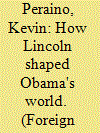|
|
|
Sort Order |
|
|
|
Items / Page
|
|
|
|
|
|
|
| Srl | Item |
| 1 |
ID:
097015


|
|
|
|
|
| Publication |
2010.
|
| Summary/Abstract |
Frederick Douglass's Freedmen's Monument speech of 1876 is notable for its complexity, and commentators have offered widely varying readings. Critics have judged it an abdication of racial responsibility, indicative of an unwarranted optimism characteristic of Douglass's larger argument on racial reform. In this article, I explicate this speech, highlighting the complex rhetorical design in which Douglass forges a memory of Lincoln as a medium for issuing carefully targeted appeals to the interests and virtues of black and white Americans. In its hitherto underappreciated theoretical dimension, the speech epitomizes a theory of racial progress that challenges recent, pessimistic readings of America's racial history and prospects.
|
|
|
|
|
|
|
|
|
|
|
|
|
|
|
|
| 2 |
ID:
106042


|
|
|
|
|
| Publication |
2011.
|
| Summary/Abstract |
American history textbooks for the USA's public schools act as quasi-official loci for the renegotiation of national identity and are, as such, subject to much controversy. The choice of heroes and the way in which textbooks depict them display the interplay between competing visions of popular ethno-history and scholarly historiography. This article examines contemporary renegotiation of the national narrative through an analysis of the evolving representation of the USA's two most prominent traditional national heroes - George Washington and Abraham Lincoln - in history textbooks for elementary-school students published from the early 1980s to 2003. This period marks the development of the multiculturalist movement and its subsequent conservative backlash, with debates intensifying in the wake of the events of 11 September 2001.
|
|
|
|
|
|
|
|
|
|
|
|
|
|
|
|
| 3 |
ID:
124715


|
|
|
|
|
| Publication |
2013.
|
| Summary/Abstract |
ONE DAY during the Civil War, a group of men arrived at the White House demanding to see Abraham Lincoln. They were determined, they told the U.S. president, to get their man appointed as a diplomat in the Sandwich Islands--modern-day Hawaii. After making their case on merit, one of the men added earnestly that their nominee was in poor health and that the balmy island weather would do him good. Lincoln wasn't buying it. "Gentlemen," he said before sending them on their way, "I am sorry to say that there are eight other applicants for that place, and they are all sicker than your man."
|
|
|
|
|
|
|
|
|
|
|
|
|
|
|
|
| 4 |
ID:
095518


|
|
|
|
|
| Publication |
2010.
|
| Summary/Abstract |
Having triumphantly forced Iraq from Kuwait only a few months before, President George H. W. Bush turned to address the faithful at the 1991 annual conference of the Southern Baptist Convention, America's largest Protestant denomination and a growing force in Republican politics. Bush's choice of venue revealed much about the power shift in the Republican party's religious and regional identity: here was a straight-laced Episcopalian, born and raised in the Northeast, paying homage to the largely evangelical Southern Baptists. "During the Gulf crisis, Barbara and I, and much of this nation . . . found guidance and comfort in prayer. For me, prayer has always been important but quite personal," he confessed to the increasingly political Southern Baptists. "You know us Episcopalians," he added wryly in a nod to their staid reputation, to the laughter of the Baptist delegates. "And like a lot of people," he continued,
I have worried a little bit about shedding tears in public, or the emotion of it. But as Barbara and I prayed at Camp David before the air war began, we were thinking about those young men and women overseas. And the tears started down my cheeks, and our minister smiled back, and I no longer worried how it looked to others.
|
|
|
|
|
|
|
|
|
|
|
|
|
|
|
|
| 5 |
ID:
102130


|
|
|
|
|
| Publication |
2011.
|
| Summary/Abstract |
In Spring 2010, a manuscript version of Ralph Ellison's unfinished second novel, Three Days before the Shooting, was finally published. Written over the course of more than forty years and running to 1,100 pages, the novel not only has a great deal to tell us about Ellison's craft and his approach to the civil rights movement; it also speaks eloquently to traditions of leadership on American race relations stretching from the days of Abraham Lincoln and Frederick Douglass through the rise of Martin Luther King, Jr., and, ultimately, Barack Obama.
|
|
|
|
|
|
|
|
|
|
|
|
|
|
|
|
| 6 |
ID:
123153


|
|
|
|
|
|
|
|